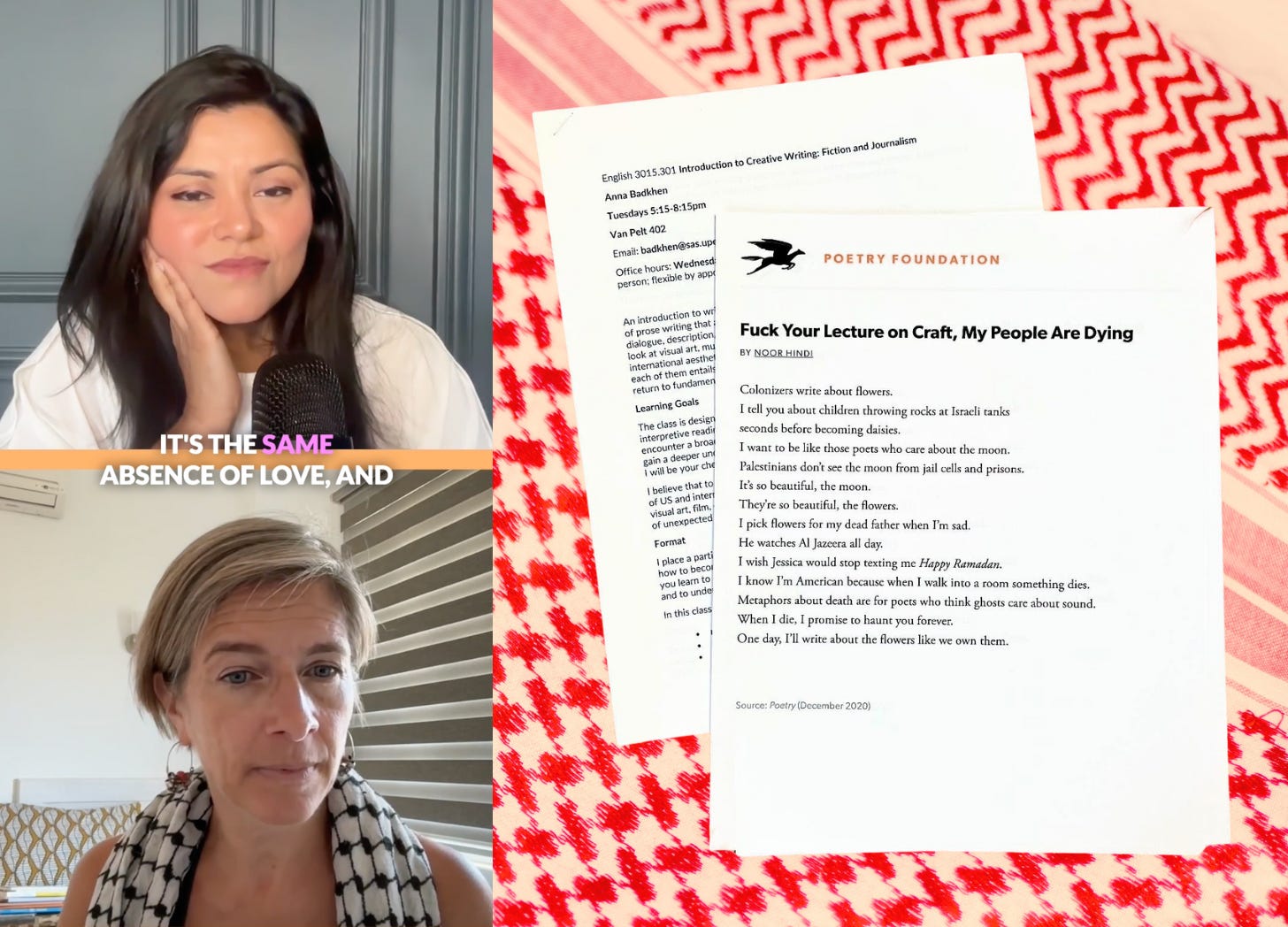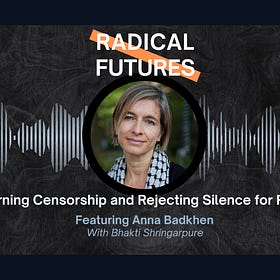"A world order facilitated by the absolute failure of love" - Anna Badkhen
By Bhakti Shringarpure.
Some of us learned new things this week. We learned a new term called “double tap” — this is when a bomb or missile strike is followed by a second strike just as medical responders and evacuation staff go in to rescue survivors. We have Israel to thank for teaching us new ways to be inhuman everyday. They killed 20 people in their precisely aimed and precisely timed “double tap strike” at Nasser Hospital this week. The first strike was on patients and medical staff, and the second strike was for journalists and rescue teams. Not to worry though: it was a “tragic mistake” and Benjamin Netanyahu has apologized. Israel explained that they were targeting a camera but got the humans who held the camera instead. Western journalists bravely reported these “errors” by cutting and pasting memos delivered by the Israeli army. This sufficed as factchecking for the news organizations. The job was done and they all lived happily ever after.
Except for one. One singular Western photojournalist revolted.
Valerie Zink, a stringer for Reuters cut up her press pass into two and said she’s had enough. “When Israel murdered Anas Al-Sharif, together with the entire Al-Jazeera crew in Gaza City on August 10, Reuters chose to publish Israel’s entirely baseless claim that Al-Sharif was a Hamas operative – one of countless lies that media outlets like Reuters have dutifully repeated and dignified.” She explained in her Facebook post that “Western media is directly culpable for creating the conditions in which this can happen.” More courage to Valerie, and the fervent hope is that she will inspire mass resignations from media outlets that have been complicit in aiding and abetting Israel’s genocide of Palestinians.
For “us” who simply cannot fathom “them,” the fall of the fourth estate has been extraordinary to watch in real time. Many of us have been critical of the colonial structures that undergird the press and journalistic institutions but we always held out hope that with education and a push for reform, these institutions will improve for the better. But no, all lines have now been crossed.
With my brilliant comrades Suchitra Vijayan and Madhuri Sastry, I recorded 25 podcast episodes entirely dedicated to unpacking media gaslighting and promoting media literacy. 25 episodes! Yet, the needle does not move.
Why have there been no mass resignations? Western journalists feel a complete detachment and utter lack of care for the 274 journalists that have been assassinated by Israel in front of the world’s eyes. Not to mention they are quite okay with the thousands and thousands of Palestinians dead. They parrot that every individual out of those thousands, even the babies, are dangerous terrorists. They don’t see the irony: they are the ones who terrorize with their bloodthirsty fictions and crude fantasies.
We trudge on. Complicity, self-censorship and silence are also recurring themes on my interviews podcast Radical Futures. Most recently, I spoke with writer Anna Badkhen. Originally from Russia, she’s an accomplished author of 7 books and has also had long career as a journalist reporting from war zones.
Anna and I started by talking about her recent article “The Pen and the Sword: Censorship Threatens Us All” for The Markaz Review. She admitted that this article was unlike the sort of literary essays she usually works on but she found it vital to educate fellow journalists and writers about how to discern when they are being censored.
Episode 11: Discerning Censorship and Rejecting Silence for Palestine: Featuring Anna Badkhen
If you’re being censored or policed, “you learn to recognize the signals your body sends you,” writer Anna Badkhen explains. A few months ago, Anna had turned down an invitation to participate in PEN America’s World Voices festival to protest their “absolutely despicable treatment” of Palestinian writers and journalists. She articulated the reasons for …
If you’re being censored or policed, “you learn to recognize the signals your body sends you.” Censorship did not always mean obviously grisly modes of surveillance and violence, and Anna understood this early on in her career when she began working as a young journalist within the totalitarian state structure in Russia.
Anna explained that in publishing and in journalism, the “machine of censorship” does not simply involve strikethrough edits or refusal to publish a particular author or a straight-up ban. It can be much subtler with an editor pushing for certain line edits, tonal changes or asking for the use of different terminology.
We soon began talking about the deafening silence from the Western liberal intelligentsia that includes writers, academics, journalists and poets. Anna insists that even if any individual writer or journalist or academic has everything to lose from speaking out about Palestine, we should all be cultivating a “moral sense of proportion.”
“I live very comfortably during the war, to paraphrase Ilya Kaminsky's poem,” Anna says this to remind us that these are not our homes that are being “firebombed” but it is the Palestinians who are living amid the fire.
I asked her to look back on her years as a war reporter in order to understand how we can write about war. Anna says she decided to cover war by deciding to “write about people who didn't choose to be in it.” In all “mass violence” events such as Gaza, “most victims and most survivors are civilian.” To engage ethically with war “you have to invest love and loss in the community.”
It is clear that this is precisely what is missing from the coverage of Gaza today. The dehumanization of Palestinians is so complete and so structural that investing anything in the community has become impossible.
How did we get here? Anna believes we are currently living in “a world order facilitated by the absolute failure of love.”
Love is the only answer to counter the bulwark of hatred and violence. She evokes James Baldwin’s beautiful line about how love has never been a popular movement: “The world is held together, really it is held together, by the love and the passion of a very few people,” Baldwin said. Anna builds on Baldwin to remind us that “love is an active verb” and that love has “to be practiced, to be maintained.”
It’s tall order but we must take the imperative seriously as we wait at the doors of hellfire and brimstone Let us try together not to fall in.
Love and solidarity❤️🔥
Bhakti Shringarpure
Listen to Anna here.
Postscript
In a time of immense strife where focus and the “normal” has been hard, I have been happy to bring you the Radical Futures podcast. Having meaningful conversations with writers, artists, scholars, activists is my way of making sense of the world and I know many of these episodes strike a chord in listeners; they lend language, images and theory to grapple with the chaos. I have many clever and passionate guests in the pipeline in the coming months: Omar El-Akkad, Haider Eid, Samar Al-Bulushi, Sisonke Msimang, Maxamed Abumaye, Sunny Singh and more. Your subscriptions and follows make all the difference in order for me to keep doing this. I hope you will subscribe at some of the platforms such as Apple, Spotify and YouTube.
And if you’re able to upgrade to a paid subscription to the Radical Books Collective, it will go a long way for producing and editing costs that can help grow the podcast. Click on the link to choose a paid plan: https://www.radicalbookscollective.com/subscribe
In the coming month, I will send out something like a poll to figure out future directions for Radical Books Collective. Even though it is beautiful and comforting to come together for the book clubs, I know that many also feel fatigue about wanting to engage and gather when despair and gloom is the main mood. But I want keep using this platform and your unwavering support to find a way out of the weeds, and find moments of solidarity and solace. Feel free to write to me if you have ideas. You can reply to this newsletter or email at decolonizethat@gmail.com I would love to hear from you.





I often use Noor Hindi’s poem when teaching future therapist. So powerful